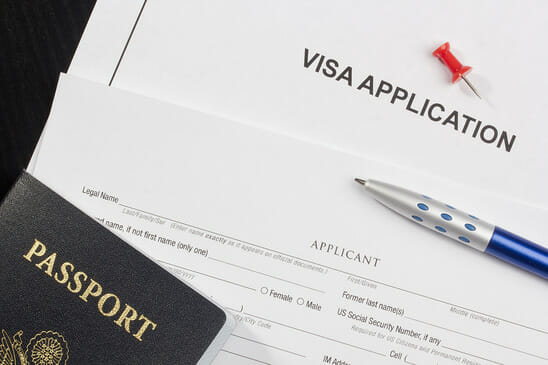 CALL US TODAY
CALL US TODAY  CALL US TODAY
CALL US TODAY  CALL US TODAY
CALL US TODAY 
The December 20, 2017 New York Times article “Without New Laws or Walls, Trump Presses the Brake on Legal Immigration” insinuates that the Trump Administration is purposely slowing down the H1-B visa process by drowning potential immigrants in paperwork and red tape.

The H1-B visa category is a temporary, non-immigrant visa category that allows U.S. employers to petition for highly-educated foreign professionals to work in specialty occupations, requiring at least a bachelor’s degree or the equivalent.[1] We often see jobs in fields such as technology, engineering, science, medicine, architecture, and mathematics often qualifying; however, any professional level job that requires an employee to have a bachelor’s degree or higher can come under the HI-B visa category for specialty occupations.[2]
The typical duration of an H1-B visa is three years, which sometimes can be extended up to six years.
Congress limits the number of H1-B visas that are made available each year. The current statutory cap is 65,000 visas, with an additional 20,000 visas for foreign professionals who graduate with a Master’s or Doctorate from a U.S. institution of higher learning.[3]
Every year, U.S. employers who are seeking out highly-skilled foreign professionals, can file petitions with the USCIS (U.S. Citizen and Immigration Services) for H1-B visas for these professionals on the first business day in April. In recent years, USCIS has received more petitions for these visas than the number of visas they are allowed to give out.[4] If the statutory cap for these visas is hit during the first five business days, USCIS conducts a lottery to determine which employers’ petitions for H1-B workers will be processed.[5]
According to the New York Times article, applicants lucky enough to be selected through the lottery program are “drawing more scrutiny.” “Officials are asking for extra details about applicants’ education and work history, the position to be filled and the employer, requiring the company to amass many additional documents, which can postpone a decision by several months.”[6]
Pursuant to the most recent data form United States Citizenship and Immigration Services, the number of “requests for evidence” for H1-Bs during January to August of 2017 was 44 percent higher than during January to August of 2016.[7]
The New York Times article also cites these statistics: in October and November of 2017, 86 percent and 82 percent of H1-B applications were approved; however, in October and November of 2016, 93 percent and 92 percent of H1-B applications were approved.[8]
And the problem is not just limited to the slowing down of H1-B visas. The New York Times article also mentions the following concerning changes:
Viewed together, these changes show an organized, intentional slow-down that affects people’s ability to work, travel, and feel secure, and has a tremendous impact on U.S. citizen spouses, children, and other family members.
Here at the Law Office of Eric M. Mark, our immigration lawyers are commited to staying abreast of new developments and changes in the highly complicated, constantly changing areas of immigration law. Our experienced, dedicated immigration attorneys will help you navigate through the complex aspects and procedures of immigration law and work tirelessly to advocate on your behalf. You can learn more about our immigration law practice areas by visiting our website.
To schedule your free consultation with an experienced immigration lawyer in Newark, NJ or Jersey City, NJ, contact us online at the Law Office of Eric M. Mark or call (973) 453-2009.
[1] https://americanimmigrationcouncil.org/research/h1b-visa-program-fact-sheet
[2] http://workpermit.com/immigration/usa/us-h-1b-visa-specialty-workers
[3] https://americanimmigrationcouncil.org/research/h1b-visa-program-fact-sheet
[4] https://americanimmigrationcouncil.org/sites/default/files/research/the_h-1b_visa_program_a_primer_on_the_program_and_its_impact_on_jobs_wages_and_the_economy.pdf
[5] https://americanimmigrationcouncil.org/sites/default/files/research/the_h-1b_visa_program_a_primer_on_the_program_and_its_impact_on_jobs_wages_and_the_economy.pdf
[6] https://www.nytimes.com/2017/12/20/us/trump-immigration-slowdown.html
[7] https://www.nytimes.com/2017/12/20/us/trump-immigration-slowdown.html
[8] https://www.nytimes.com/2017/12/20/us/trump-immigration-slowdown.html
[9] https://www.nytimes.com/2017/12/20/us/trump-immigration-slowdown.html
[10] https://www.nytimes.com/2017/12/20/us/trump-immigration-slowdown.html
[11] https://www.nytimes.com/2017/12/20/us/trump-immigration-slowdown.html
[12] https://www.nytimes.com/2017/12/20/us/trump-immigration-slowdown.html
[13] https://www.nytimes.com/2017/12/20/us/trump-immigration-slowdown.html
[14] https://www.nytimes.com/2017/12/20/us/trump-immigration-slowdown.html